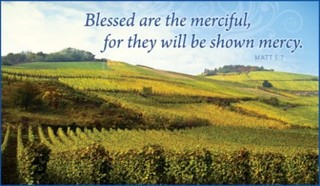
Change Translation
- Recent Translations
- All Translations
Images for Matthew 5:1


Share
Matthew 5:1 Meaning and Commentary
And seeing the multitudes
The great concourse of people that followed him from the places before mentioned,
he went up into a mountain;
either to pray alone, which was sometimes his custom to do, or to shun the multitude; or rather, because it was a commodious place for teaching the people:
and when he was set:
not for rest, but in order to teach; for sitting was the posture of masters, or teachers, see ( Matthew 13:2 ) ( Luke 4:20 ) ( 5:3 ) ( John 8:2 ) . The form in which the master and his disciples sat is thus described by Maimonides F26.
``The master sits at the head, or in the chief place, and the disciples before him in a circuit, like a crown; so that they all see the master, and hear his words; and the master may not sit upon a seat, and the scholars upon the ground; but either all upon the earth, or upon seats: indeed from the beginning, or formerly, (bvwy brh hyh) "the master used to sit", and the disciples stand; but before the destruction of the second temple, all used to teach their disciples as they were sitting.''With respect to this latter custom, the Talmudists say F1, that
``from the days of Moses, to Rabban Gamaliel (the master of the Apostle Paul), they did not learn the law, unless standing; after Rabban Gamaliel died, sickness came into the world, and they learnt the law sitting: hence it is a tradition, that after Rabban Gamaliel died, the glory of the law ceased.''His disciples came unto him;
not only the twelve, but the company, or multitude, of his disciples, ( Luke 6:17 ) which he made in the several places, where he had been preaching; for the number of his disciples was larger than John's.
F26 Hilch. Talmud Torah, c. 4. sect. 2.
F1 T. Bab. Megilla, fol. 21. 1. Vid. Misn. Sota, c. 9. sect. 15. & Jarchi, Maimon, & Bartenora in ib.
Matthew 5:1 In-Context
Footnotes 1
- [a] It is well to notice here an habitual use of the article. It is a known rule that contrast, and hence one part of a thing as contradistinguished from another, has the article. This is the case with 'ship' and 'mountain' in the gospels: 'he was' or 'went' 'on board ship;' not a particular ship, but 'on board ship,' as we say, in contrast with 'on shore.' So 'the mountain;' not a particular mountain, but in contrast with the plain, where the plain and the mountain are in contrast. Christ had a particular ship which waited on him, but the article is used, as here, where that is not the case. 'In the ship with' is tantamount to 'the same ship;' so here I do not change the form, but translate literally.
Study Tools
PLUSUnlock Notes
This feature is for PLUS subscribers only. Join PLUS today to access these tools and more.
JOIN PLUSUnlock Highlights
This feature is for PLUS subscribers only. Join PLUS today to access these tools and more.
JOIN PLUSUnlock Bookmarks
This feature is for PLUS subscribers only. Join PLUS today to access these tools and more.
JOIN PLUSTrack Your Reading
Create a free account to start a reading plan, or join PLUS to unlock our full suite of premium study tools.